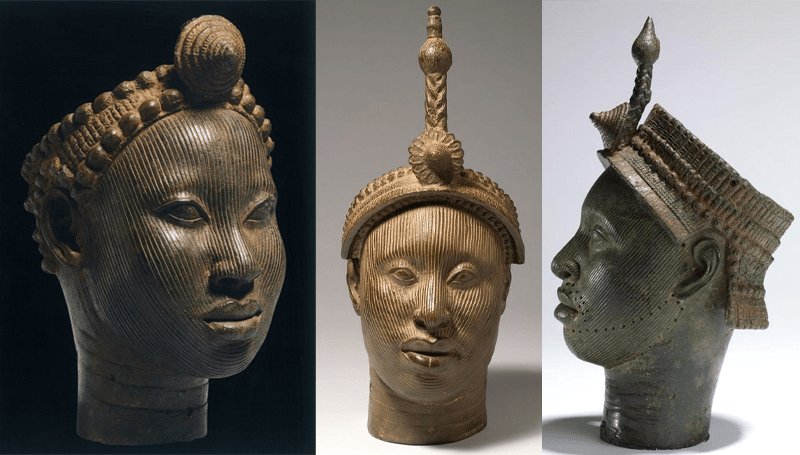Yoruba Metal Art: There is well-documented evidence that iron smelting and forging technologies may have existed in West Africa as early as the 6th century BC among the Nok people of Nigeria. Iron technology appears to have played a critical role in the fundamental social assets that fuelled the growth of significant centralized civilizations in the West African region between 1400 and 1600.
The development of iron tools and weapons resulted in extensive mechanized agriculture, efficient hunting, and successful warfare, all of which contributed to the growth of large urban centers.
Iron was also important in the rise of Yoruba kingdoms, particularly the Ife and Oyo Empires. They had a lot of contact with one another, so they have similar beliefs about the properties of iron and the methods for smelting it. Ife metal castings appear to be some of the finest Sub-Saharan art; they are mostly hollow-cast heads used in ancestral rites and have a naturalistic appearance.
There are indications that the first caster originated in Ife around the 14th century, according to tradition. And the most common forms were heads of dead Benin kings, usually supported by a carved-out ivory tusk.
These were placed on altars alongside other figurative castings and bells and dedicated to early kings. Figured plaques were also used as architectural designs and decorations.
For example, among the Yorubas, Ogun, the god of iron, is a revered deity. It is widely regarded as the first warrior and hunter, as well as the inventor of iron. Furthermore, Ogun is known for opening roads, clearing fields, and establishing great dynasties.
The distinctive iron sword of Ogun, a Yoruba Metal Art that is often regarded as a symbolic cultural motif, is associated with both civilizing and aggressive actions.
The Bronze Head of Ife is one of the most well-known Yoruba metal works. The copper alloy sculpture, discovered in Ife in 1938, is thought to represent a king and was most likely made between the 13th and 14th centuries, long before European contact with the local population.
The sophisticated sculptures’ realism and authenticity challenged the western conceptualization of African art at the time. The Ife head was transported to the British Museum a year after its exhumation.
Because of their historical significance and as a testament to the Yorubas’ rich civilization, Ife heads are now widely used in logos and branding of Nigerian corporations and educational institutions, such as the one used for Obafemi Awolowo University in Ile-Ife.
Because of its symbolic importance, the British Museum’s Ife head was included in the major exhibition Kingdom of Ife: Sculptures from West Africa, which was organized in collaboration with Nigeria’s National Commission for Museums and Monuments, the Museum for African Art in New York, and the British Museum. The entire exhibition was part of a series of events commemorating Nigeria’s 50th anniversary of independence.
All of this demonstrates that, long before European contact with West Africa, the Yorubas developed a highly sophisticated iron industry that reflected their civilization and ingenuity.

